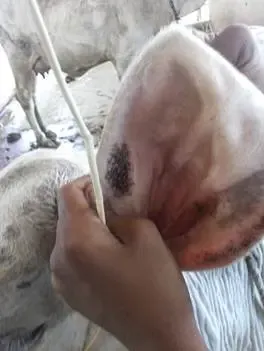Has India Unveiled Its First Homegrown CRISPR-based Gene Therapy for Sickle Cell Disease?

Synopsis
Key Takeaways
- India launches its first indigenous CRISPR-based therapy for Sickle Cell Disease.
- The therapy, named BIRSA 101, honors a tribal freedom fighter.
- It offers a potential cure and transforms treatment for hereditary disorders.
- Developed by CSIR-IGIB, it aims to make innovative treatments affordable.
- The initiative aligns with the vision of a Sickle Cell–Free India by 2047.
New Delhi, Nov 19 (NationPress) In a remarkable advancement for Atmanirbhar Bharat, the government has introduced an indigenous CRISPR-based gene therapy for Sickle Cell Disease, a condition that predominantly impacts the tribal communities in India.
This innovative, cost-effective gene editing treatment, termed "BIRSA 101" in tribute to the revered tribal freedom fighter Bhagwan Birsa Munda, was inaugurated by Union Minister of State (Independent Charge) for Science and Technology Dr. Jitendra Singh.
The therapy acts as a "precise genetic surgery", not only offering a potential cure for Sickle Cell Disease but also revolutionizing treatment options for various hereditary ailments, as highlighted by the Minister.
Sickle Cell Disease is a persistent, single-gene disorder that leads to a debilitating systemic condition, marked by chronic anemia, painful episodes, organ damage, and significantly shortened life expectancy.
This genetic blood disorder profoundly affects the patient's life, resulting in severe health complications.
"India has officially embarked on its significant journey towards achieving a Sickle Cell Disease–free nation, marking a pivotal moment in our public health and genomic medicine landscape,” remarked Singh.
“With the launch of India’s first homegrown CRISPR-based gene therapy, the country has made a substantial stride towards realizing Prime Minister Narendra Modi’s vision of a Sickle Cell–Free India by 2047, while also advancing the mission of Atmanirbhar Bharat in cutting-edge medical technologies,” he continued.
This groundbreaking therapy, developed at the CSIR-Institute of Genomics and Integrative Biology (IGIB), showcases India’s capability to create revolutionary therapies at a fraction of the global costs, potentially replacing treatments that can cost between Rs 20-25 crore abroad.
IGIB has formalized a technology transfer and collaboration agreement with the Serum Institute of India in Pune to enhance the engineered enFnCas9 CRISPR platform, making it accessible for Sickle Cell Disease and other significant genetic disorders.
“Globally, gene therapies often exceed three million dollars, making them unattainable for even the wealthy. Our goal is to leverage Indian innovation to benefit the most underprivileged,” stated Dr. Umesh Shaligram, Executive Director of the Serum Institute of India.









